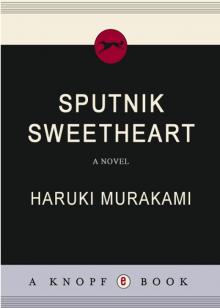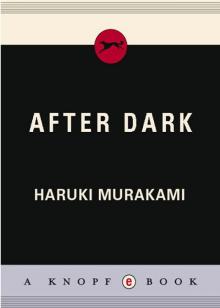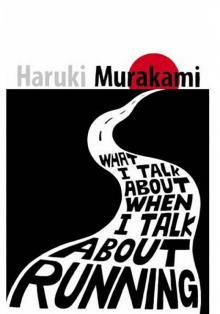- Home
- Haruki Murakami
Vintage Murakami Page 3
Vintage Murakami Read online
Page 3
“But you’re judging that they’re not needed.”
“I’m not judging anything. They’re waiting to be burned. I’m simply obliging. You get it? I’m just taking on what’s there. Just like the rain. The rain falls. Streams swell. Things get swept along. Does the rain judge anything? Well, all right, does this make me immoral? In my own way, I’d like to believe I’ve got my own morals. And that’s an extremely important force in human existence. A person can’t exist without morals. I wouldn’t doubt if morals weren’t the very balance to my simultaneity.”
“Simultaneity?”
“Right, I’m here, and I’m there. I’m in Tokyo, and at the same time I’m in Tunis. I’m the one to blame, and I’m also the one to forgive. Just as a for instance. It’s that level of balance. Without such balance, I don’t think we could go on living. It’s like the linchpin to everything. Lose it and we’d literally go to pieces. But for the very reason that I’ve got it, simultaneity becomes possible for me.”
“So what you’re saying is, the act of burning barns is in keeping with these morals of yours?”
“Not exactly. It’s an act by which to maintain those morals. But maybe we better just forget the morality. It’s not essential. What I want to say is, the world is full of these barns. Me, I got my barns, and you got your barns. It’s the truth. I’ve been almost everywhere in the world. Experienced everything. Came close to dying more than once. Not that I’m proud of it or anything. But okay, let’s drop it. My fault for being the quiet type all the time. I talk too much when I do grass.”
We fell silent, burned out. I had no idea what to say or how. I was sitting tight in my mental passenger seat, just watching one weird scene after the next slip past the car window. My body was so loose I couldn’t get a good grasp on what the different parts were doing. Yet I was still in touch with the idea of my bodily existence. Simultaneity, if ever there was such a thing: Here I had me thinking, and here I had me observing myself think. Time ticked on in impossibly minute polyrhythms.
“Care for a beer?” I asked a little later.
“Thank you. I would.”
I went to the kitchen, brought out four cans and some Camembert, and we helped ourselves.
“When was the last time you burned a barn?” I had to ask.
“Let’s see, now.” He strained to remember, beer can in hand. “Summer, the end of August.”
“And the next time, when’ll that be?”
“Don’t know. It’s not like I work out a schedule or mark dates in my calendar. When I get the urge, I go burn one.”
“But, say. When you get this urge, some likely barn doesn’t just happen to be lying around, does it?”
“Of course not,” he said quietly. “That’s why I scout out ones ripe for burning in advance.”
“To lay in stock.”
“Exactly.”
“Can I ask you one more question?”
“Sure.”
“Have you already decided on the next barn to burn?”
This caused him to furrow up wrinkles between his eyes; then he inhaled audibly through his nose. “Well, yes. As a matter of fact, I have.”
I sipped the last of my beer and said nothing.
“A great barn. The first barn really worth burning in ages. Fact is, I went and checked it out only today.”
“Which means, it must be nearby.”
“Very near,” he confirmed.
So ended our barn talk.
At five o’clock, he roused his girlfriend, and then apologized to me again for the sudden visit. He was completely sober, despite the quantities of beer I’d seen him drink. Then he fetched the sports car from around back.
“I’ll keep an eye out for that barn,” I told him.
“You do that,” he answered. “Like I said, it’s right near here.”
“What’s this about a barn?” she broke in.
“Man talk,” he said.
“Oh, great,” she fawned.
And at that, the two of them were gone.
I returned to the living room and lay down on the sofa. The table was littered with all manner of debris. I picked up my duffle coat off the floor, pulled it over my head, and conked out.
Bluish gloom and a pungent marijuana odor covered everything. Oddly uneven, that darkness. Lying on the sofa, I tried to remember what came next in the elementary-school play, but it was long since irretrievable. Did the fox cub ever get the gloves?
I got up from the sofa, opened a window to air the place, went to the kitchen, and made myself some coffee.
THE following day, I went to a bookstore and bought a map of the area where I live. Scaled 20,000:1 and detailed down to the smallest lanes. Then I walked around with the map, penciling in X’s wherever there was a barn or shed. For the next three days, I covered four kilometers in all four directions. Living toward the outskirts of town, there are still a good many farmers in the vicinity. So it came to a considerable number of barns—sixteen altogether.
I carefully checked the condition of each of these, and from the sixteen I eliminated all those where there were houses in the immediate proximity or greenhouses alongside. I also eliminated those in which there were farm implements or chemicals or signs that they were still in active use. I didn’t imagine he’d want to burn tools or fertilizer.
That left five barns. Five barns worth burning. Or, rather, five barns unobjectionable if burned. The kind of barn it’d take fifteen minutes to reduce to ashes, then no one would miss it. Yet I couldn’t decide which would be the one he’d be most likely to torch. The rest was a matter of taste. I was beside myself for wanting to know which of the five barns he’d chosen.
I unfolded my map and erased all but those five X’s. I got myself a right angle and a French curve and dividers, and tried to establish the shortest course leaving from my house, going around the five barns, and coming back home again. Which proved to be a laborious operation, what with the roads winding about hills and streams. The result: a course of 7.2 kilometers. I measured it several times, so I couldn’t have been too far off.
The following morning at six, I put on my training wear and jogging shoes and ran the course. I run six kilometers every morning anyway, so adding an extra kilometer wouldn’t kill me. There were two railroad crossings along the way, but they rarely held you up. And otherwise, the scenery wouldn’t be bad.
First thing out of the house, I did a quick circuit around the playing field of the local college, then turned down an unpaved road that ran along a stream for three kilometers. Passing the first barn midway, a path took me through woods. A slight uphill grade, then another barn. A little beyond that were racehorse stables. The Thoroughbreds would be alarmed to see flames—but that’d be it. No real damage.
The third and fourth barns resembled each other like ugly twins. Set not two hundred meters apart, both were weather-beaten and dirty. You might as well torch the both of them together.
The last barn stood beside a railroad crossing. Roughly the six-kilometer mark. Utterly abandoned, the barn had a tin Pepsi-Cola billboard nailed to the side facing the tracks. The structure—if you could call it that—was such a shambles, I could see it, as he would say, just waiting to be burned.
I paused before this last barn, took a few deep breaths, cut over the crossing, and headed home. Running time: thirty-one minutes thirty seconds. I showered, ate breakfast, stretched out on the sofa to listen to one record, then got down to work.
For one month, I ran the same course each morning. But—no barns burned.
Sometimes, I could swear he was trying to get me to burn a barn. That is, to plant in my head the image of burning barns, so that it would swell up like a bicycle tire pumped with air. I’ll grant you, there were times that, well, as long as I was waiting around for him to do the deed, I half considered striking the match myself. It would have been a lot faster. And anyhow, they were only rundown old barns. . . .
Although on second thought, no, let’s not get carri
ed away. You won’t see me torch any barn. No matter how inflated the image of burning barns grew in my head, I’m really not the type. Me, burn barns? Never. Then what about him? He’d probably just switched prospects. Or else he was too busy and simply hadn’t found the time to burn a barn. In any case, there was no word from her.
December came and went, and the morning air pierced the skin. The barns stood their ground, their roofs white with frost. Wintering birds sent the echo of flapping wings through the frozen woods. The world kept in motion unchanged.
THE next time I met the guy was in the middle of December last year. It was Christmas carols everywhere you went. I had gone into town to buy presents for different people, and while walking around Nogizaka I spotted his car. No mistake, his silver-gray sports car. Shinagawa license plate, small dent next to the left headlight. It was parked in the lot of a café, looking less sparkling than when I last saw it, the silver-gray a hint duller. Though maybe that was a mistaken impression on my part: I have this convenient tendency to rework my memories. I dashed into the café without a moment’s hesitation.
The place was dark and thick with the strong aroma of coffee. There weren’t many voices to be heard, only atmospheric baroque music. I recognized him immediately. He was sitting alone by the window, drinking a café au lait. And though it was warm enough in there to steam up my glasses, he was wearing a black cashmere coat, with his muffler still wrapped around his neck.
I hedged a second, but then figured I might as well approach the guy. I decided not to say I’d seen his car outside; I’d just happened to step in, and by chance there he was.
“Mind if I sit down?” I asked.
“Please, not at all,” he replied.
We talked a bit. It wasn’t a particularly lively conversation. Clearly, we didn’t have much in the way of common topics; moreover, his mind seemed to be on something else. Still, he didn’t show any sign of being put out by my presence. At one point, he mentioned a seaport in Tunisia, then he started describing the shrimp they caught there. He wasn’t just talking for my sake: He really was serious about these shrimp. All the same, like water to the desert, the story didn’t go anywhere before it dissipated.
He signaled to the waiter and ordered a second café au lait.
“Say, by the way, how’s your barn doing?” I braved the question.
The trace of a smile came to his lips. “Oh, you still remember?” he said, removing a handkerchief from his pocket to wipe his mouth. “Why, sure, I burned it. Burned it nice and clean. Just as promised.”
“One right near my house?”
“Yeah. Really, right by there.”
“When?”
“Last—when was it? Maybe ten days after I visited your place.”
I told him about how I plotted the barns on my map and ran my daily circuit. “So there’s no way I could have not seen it,” I insisted.
“Very thorough,” he gibed, obviously having his fun. “Thorough and logical. All I can say is, you must have missed it. Does happen, you know. Things so close up, they don’t even register.”
“It just doesn’t make sense.”
He adjusted his tie, then glanced at his watch. “So very, very close,” he underscored. “But if you’ll excuse me, I’ve got to be going. Let’s talk about it next time, shall we? Can’t keep a person waiting. Sorry.”
I had no plausible reason to detain the guy any further.
He stood up, pocketed his cigarettes and lighter, and then remarked, “Oh, by the way, have you seen her lately?”
“No, not at all. Haven’t you?”
“Me, neither. I’ve been trying to get in touch, but she’s never in her apartment and she doesn’t answer the phone and she hasn’t been to her pantomime class the whole while.”
“She must have taken off somewhere. She’s been known to do that.”
The guy stared down at the table, hands buried in his pockets. “With no money, for a month and a half? As far as making her own way, she hardly has a clue.”
He was snapping his fingers in his coat pocket.
“I think I know that girl pretty well, and she absolutely hasn’t got yen one. No real friends to speak of. An address book full of names, but that’s all they are. She hasn’t got anyone she can depend on. No, I take that back, she did trust you. And I’m not saying this out of courtesy. I do believe you’re someone special to her. Really, it’s enough to make me kind of jealous. And I’m someone who’s never ever been jealous at all.” He gave a little sigh, then eyed his watch again. “But I really must go. Be seeing you.”
Right, I nodded, but no words came. The same as always, whenever I was thrown together with this guy, I became altogether inarticulate.
I tried calling her any number of times after that, but her line had apparently been disconnected. Which somehow bothered me, so I went to her apartment and encountered a locked door, her mailbox stuffed with fliers. The superintendent was nowhere to be found, so I had no way to know if she was even living there anymore. I ripped a page from my appointment book, jotted down “Please contact,” wrote my name, and shoved it into the mailbox.
Not a word.
The next time I passed by, the apartment bore the nameplate of another resident. I actually knocked, but no one was in. And like before, no superintendent in sight.
At that, I gave up. This was one year ago.
She’d disappeared.
EVERY morning, I still run past those five barns. Not one of them has yet burned down. Nor do I hear of any barn fires. Come December, the birds strafe overhead. And I keep getting older.
Although just now and then, in the depths of the night, I’ll think about barns burning to the ground.
—Translated by Alfred Birnbaum
SHIZUKO AKASHI
Ii-yu-nii-an [Disneyland]
I talked to Shizuko Akashi’s elder brother, Tatsuo, on December 2, 1996, and the plan was to visit her at a hospital in a Tokyo suburb the following evening.
I was uncertain whether or not Tatsuo would allow me to visit her until the very last moment. Finally he consented, though only after what must have been a considerable amount of anguished deliberation—not that he ever admitted as much. It’s not hard to imagine how indelicate it must have seemed for him to allow a total stranger to see his sister’s cruel disability. Or even if it was permissible for me as an individual to see her, the very idea of reporting her condition in a book for all the world to read would surely not go down well with the rest of the family. In this sense, I felt a great responsibility as a writer, not only toward the family but to Shizuko herself.
Yet whatever the consequences, I knew I had to meet Shizuko in order to include her story. Even though I had gotten most of the details from her brother, I felt it only fair that I meet her personally. Then, even if she responded to my questions with complete silence, at least I would have tried to interview her . . .
In all honesty, though, I wasn’t at all certain that I would be able to write about her without hurting someone’s feelings.
Even as I write, here at my desk the afternoon after seeing her, I lack confidence. I can only write what I saw, praying that no one takes o fense. If I can set it all down well enough in words, just maybe . . .
A wintry December. Autumn has slowly slipped past out of sight. I began preparations for this book last December, so that makes one year already. And Shizuko Akashi makes my sixtieth interviewee—though unlike all the others, she can’t speak her own mind.
By sheer coincidence, the very day I was to visit Shizuko the police arrested Yasuo Hayashi on faraway Ishigaki Island. The last of the perpetrators to be caught, Hayashi, the so-called Murder Machine, had released three packets of sarin at Akihabara Station on the Hibiya Line, claiming the lives of 8 people and injuring 250. I read the news in the early evening paper, then caught the 5:30 train for Shizuko’s hospital. A police officer had been quoted as saying: “Hayashi had tired of living on the run so long.”
Of course, H
ayashi’s capture would do nothing to reverse the damage he’d already done, the lives he had so radically changed. What was lost on March 20, 1995, will never be recovered. Even so, someone had to tie up the loose ends and apprehend him.
I cannot divulge the name or location of Shizuko’s hospital. Shizuko and Tatsuo Akashi are pseudonyms, in keeping with the family’s wishes. Actually, reporters once tried to force their way into the hospital to see Shizuko. The shock would surely have set back whatever progress she’d made in her therapy program, not to mention throwing the hospital into chaos. Tatsuo was particularly concerned about that.
Shizuko was moved to the Recuperation Therapy floor of the hospital in August 1995. Until then (for the five months after the gas attack) she had been in the Emergency Care Center of another hospital, where the principal mandate was to “maintain the life of the patient”—a far cry from recuperation. The doctor there had declared it “virtually impossible for Shizuko to wheel herself to the stairs.” She’d been confined to bed, her mind in a blur. Her eyes refused to open, her muscles barely moved. Once she was removed to Recuperation, however, her progress exceeded all expectations. She now sits in a wheelchair and moves around the ward with a friendly push from the nurses; she can even manage simple conversations. “Miraculous” is the word.
Nevertheless, her memory has almost totally gone. Sadly, she remembers nothing before the attack. The doctor in charge says she’s mentally “about grade-school level,” but just what that means Tatsuo doesn’t honestly know. Nor do I. Is that the overall level of her thought processes? Is it her synapses, the actual “hardware” of her thinking circuitry? Or is it a question of “software,” the knowledge and information she has lost? At this point only a few things can be said with any certainty:
Some mental faculties have been lost.
It is as yet unknown whether they will ever be recovered.
She remembers most of what’s happened to her since the attack, but not everything. Tatsuo can never predict what she’ll remember and what she’ll forget.

 Sputnik Sweetheart
Sputnik Sweetheart Dance Dance Dance
Dance Dance Dance The Wind (1) and Up Bird Chronicle (2)
The Wind (1) and Up Bird Chronicle (2) Blind Willow, Sleeping Woman
Blind Willow, Sleeping Woman Absolutely on Music: Conversations With Seiji Ozawa
Absolutely on Music: Conversations With Seiji Ozawa Norwegian Wood
Norwegian Wood South of the Border, West of the Sun
South of the Border, West of the Sun Kafka on the Shore
Kafka on the Shore Men Without Women
Men Without Women After Dark
After Dark Hard-Boiled Wonderland and the End of the World
Hard-Boiled Wonderland and the End of the World 1q84
1q84 The Wind-Up Bird Chronicle
The Wind-Up Bird Chronicle Underground: The Tokyo Gas Attack and the Japanese Psyche
Underground: The Tokyo Gas Attack and the Japanese Psyche Vintage Murakami
Vintage Murakami The Elephant Vanishes: Stories
The Elephant Vanishes: Stories Colorless Tsukuru Tazaki and His Years of Pilgrimage
Colorless Tsukuru Tazaki and His Years of Pilgrimage First Person Singular
First Person Singular After the Quake
After the Quake A Wild Sheep Chase
A Wild Sheep Chase What I Talk About When I Talk About Running
What I Talk About When I Talk About Running Birthday Girl
Birthday Girl The Elephant Vanishes
The Elephant Vanishes Norwegian Wood (Vintage International)
Norwegian Wood (Vintage International) Wind/Pinball
Wind/Pinball Norwegian Wood Vol 1.
Norwegian Wood Vol 1. Underground
Underground Colorless Tsukuru Tazaki and His Years of Pilgrimage: A novel
Colorless Tsukuru Tazaki and His Years of Pilgrimage: A novel Killing Commendatore
Killing Commendatore Absolutely on Music
Absolutely on Music